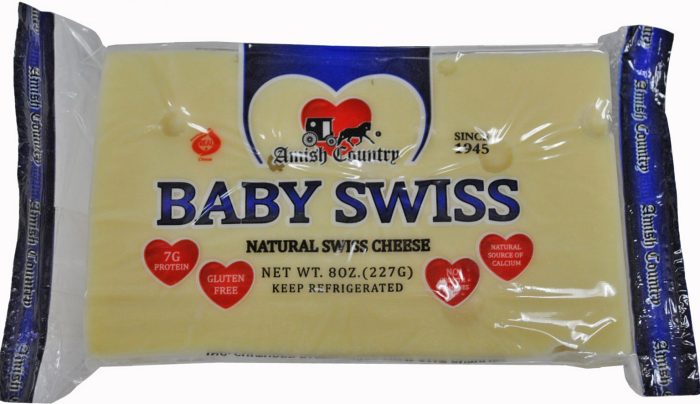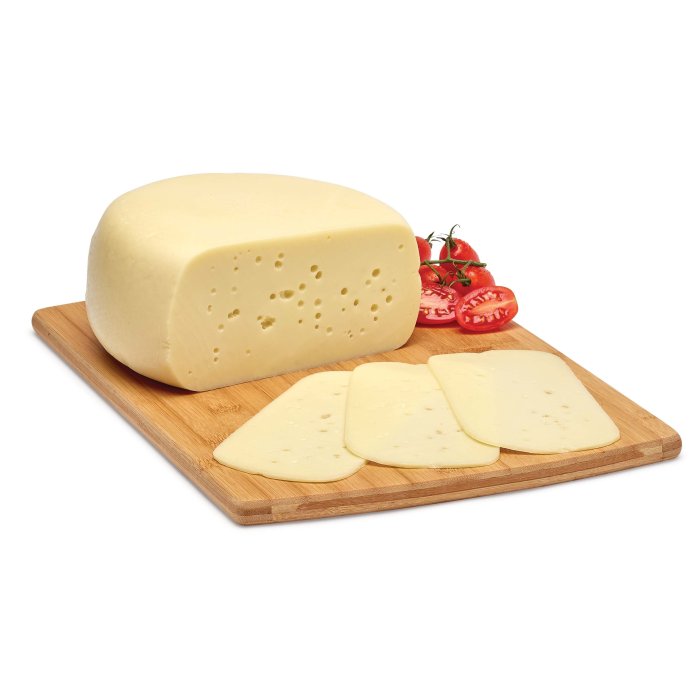Baby Swiss Cheese in a Balanced Diet for Infants and Toddlers

Baby swiss cheese nutrition – Introducing baby Swiss cheese into a young child’s diet can be a valuable addition to their nutritional intake, offering a range of benefits if introduced appropriately. However, careful consideration of age-appropriate nutrition and potential risks is crucial. This section will explore the suitability of baby Swiss cheese within a balanced diet for infants and toddlers, outlining its benefits and potential concerns.
Suitability of Baby Swiss Cheese in Infant and Toddler Diets
Baby Swiss cheese, due to its relatively mild flavor and soft texture, is generally well-tolerated by infants and toddlers once they reach the appropriate developmental stage for solid foods. The introduction should align with the recommendations of a pediatrician or registered dietitian, typically around six months of age, starting with small amounts and observing for any allergic reactions or digestive upset.
The nutritional content of baby Swiss cheese makes it a suitable addition to a varied diet, contributing to several key aspects of a child’s development. However, it’s crucial to remember that baby Swiss cheese should be part of a broader, well-balanced diet rich in fruits, vegetables, grains, and proteins, not the primary source of nutrition.
Baby Swiss cheese, with its mild flavor and slightly sweet notes, offers a good source of calcium and protein for growing bodies. However, consider the broader context of cheese consumption; for example, a richer, more indulgent experience might be found in a Panera Bread grilled cheese, whose nutritional details you can explore here: panera bread grilled cheese nutrition.
Returning to our smaller scale, remember that moderation is key when incorporating baby Swiss into a balanced diet for optimal health.
Benefits of Baby Swiss Cheese for Infants and Toddlers
Baby Swiss cheese provides a good source of calcium and protein, both vital for healthy bone development and muscle growth in young children. Calcium is essential for building strong bones and teeth, while protein is crucial for tissue repair and the overall development of the child’s body. Furthermore, baby Swiss cheese contains several essential vitamins and minerals, contributing to overall health and well-being.
The zinc content, for instance, supports immune function, and the vitamin B12 contributes to healthy nerve function and red blood cell formation. These nutrients are particularly important during periods of rapid growth and development in infancy and toddlerhood.
Potential Risks and Concerns
While generally safe, introducing baby Swiss cheese carries potential risks. Some infants may have a dairy allergy or intolerance, manifesting as skin rashes, digestive problems (such as diarrhea or vomiting), or respiratory issues. It is vital to introduce baby Swiss cheese gradually and monitor the child closely for any adverse reactions. Furthermore, the sodium content in cheese should be considered.
While baby Swiss cheese generally has a lower sodium content compared to some other cheeses, excessive sodium intake can be detrimental to a child’s health. Therefore, moderation is key. Always consult a healthcare professional if you have any concerns about introducing dairy products to your child’s diet.
Sample Meal Plan for a 1-Year-Old Incorporating Baby Swiss Cheese
A well-balanced diet is crucial for a 1-year-old’s development. The following sample meal plan incorporates baby Swiss cheese while ensuring a diverse range of nutrients:
- Breakfast: Oatmeal with pureed fruit (e.g., berries) and a small amount of grated baby Swiss cheese.
- Lunch: Whole-wheat pasta with a simple tomato sauce and small cubes of baby Swiss cheese.
- Snack: A small portion of full-fat yogurt mixed with finely grated baby Swiss cheese.
- Dinner: Chicken and vegetable puree with a small amount of finely grated baby Swiss cheese incorporated.
Note: This is a sample meal plan and portion sizes should be adjusted based on the child’s individual needs and appetite. Always consult with a pediatrician or registered dietitian for personalized dietary advice.
Comparing Baby Swiss Cheese to Other Dairy Alternatives

Choosing the right dairy products for your infant or toddler is crucial for their growth and development. This section compares baby Swiss cheese with other common dairy alternatives, considering their nutritional profiles, digestibility, and potential allergenic properties to help you make informed decisions. Remember to always consult your pediatrician before introducing new foods to your child’s diet.
Nutritional Comparison of Dairy Alternatives
The nutritional content of dairy products varies significantly. This table provides a general comparison, noting that specific values can differ based on brand and production methods. It’s important to always check the nutritional label of the specific product you are considering.
| Nutrient | Baby Swiss Cheese | Yogurt (Whole Milk) | Whole Cow’s Milk | Infant Formula |
|---|---|---|---|---|
| Calcium (mg/100g) | ~800-1000 | ~180-200 | ~120 | Variable, check label |
| Protein (g/100g) | ~25-30 | ~3-6 | ~3.5 | Variable, check label |
| Fat (g/100g) | ~25-30 | ~3-8 (depending on fat content) | ~3.5 | Variable, check label, often lower fat than whole milk |
| Vitamin A (µg/100g) | Low | Moderate | Moderate | Often fortified |
| Vitamin D (µg/100g) | Low | May be fortified | May be fortified | Often fortified |
Advantages and Disadvantages of Dairy Alternatives, Baby swiss cheese nutrition
Each dairy alternative presents unique benefits and drawbacks.Baby Swiss cheese offers a high concentration of calcium and protein, vital for bone development and muscle growth. However, its high fat content might be a concern for some infants and toddlers, and it may be difficult for very young children to chew. Additionally, it lacks certain vitamins present in fortified milk or formula.Whole milk yogurt provides calcium and protein but generally in lower quantities than cheese.
It’s often easier to digest than cheese and can be a good source of probiotics, beneficial for gut health. However, the fat content can be high, and some children may have difficulty tolerating lactose.Whole cow’s milk, while a good source of calcium, is typically introduced after 12 months and is not recommended before then due to potential digestive issues and the lack of certain nutrients crucial for infants.Infant formula is specifically designed to meet the nutritional needs of infants, often containing a balanced profile of vitamins, minerals, and proteins.
However, it is a processed product and should be used as directed by a pediatrician. It’s crucial to select a formula appropriate for the child’s age and health needs.
Choosing the Appropriate Dairy Option
Selecting the most suitable dairy product depends on several factors, including the child’s age, developmental stage, and any existing allergies or intolerances. For example, a breastfed infant might not need additional dairy products until they begin solid foods. A toddler might benefit from the calcium and protein in yogurt or small amounts of cheese, while a child with lactose intolerance might require lactose-free alternatives.
Always consult with your pediatrician to create a personalized nutrition plan for your child.
FAQ Summary: Baby Swiss Cheese Nutrition
Can I give baby Swiss cheese to a baby younger than 6 months?
No, it’s generally recommended to wait until your baby is at least 6 months old before introducing any dairy products, including baby Swiss cheese. Their digestive systems aren’t fully developed before then.
How much baby Swiss cheese is appropriate for a toddler?
Start with very small portions (e.g., a 1-inch cube) and gradually increase the amount as your toddler gets used to it. Always supervise your child while they are eating to prevent choking.
What if my baby is allergic to cow’s milk?
If your baby has a cow’s milk allergy, avoid giving them baby Swiss cheese. There are many other nutritious dairy alternatives available.
My baby seems to have gas after eating baby Swiss cheese. What should I do?
Some babies are more sensitive to dairy than others. Try offering smaller portions or temporarily removing it from their diet to see if symptoms improve. Consult your pediatrician if concerns persist.


